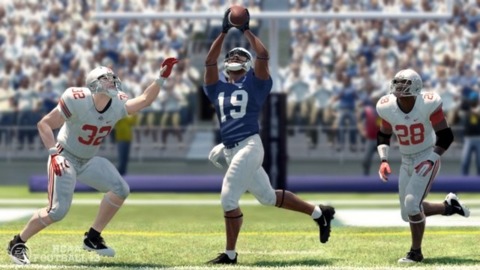EA giving up NCAA exclusivity isn't giving up anything
Settlement in antitrust lawsuit might cost $27 million, but unlikely to cost publisher its virtual monopoly on video game football.
Last week, Electronic Arts reached a settlement in a class-action lawsuit brought against it for anticompetitive behavior in scooping up exclusive gaming rights to the NFL, NCAA, and AFL football licenses. Under the terms of the agreement, the publisher will let its current deal with the NCAA lapse in 2014, and won't seek an exclusive arrangement with the league for at least five years after that.
In theory, the settlement brings to an end EA's vice-like grip on American football games, allowing someone else to make a competing NCAA title and create the sort of rivalry that leads to innovation. In reality, it's more likely to underscore just how entrenched EA's position is.
Assuming the settlement is finalized and other companies are able to make NCAA Football games starting in 2015, the big question becomes, "Who would?" EA will still make college football games, so whoever jumps into the fray would be going up against an established heavyweight.
Take-Two is the obvious choice to step up, considering it was the publisher's aggressively priced and critically acclaimed NFL 2K5 that prompted EA to lock down football exclusivity in the first place. However, the company may have lost its taste for competing with EA. Take-Two has come to regret the MLB third-party exclusivity deal it signed in the wake of EA's NFL and NCAA deals, and it put NHL 2K on ice in 2011 after years of playing a punching bag to EA's NHL series. In fact, the only good news 2K Sports has had of late has been the success of the NBA 2K series since 2010, the same year EA benched its own NBA series. And don't think Take-Two would be able to jump right back in the saddle and toss off a worthy follow-up to NFL 2K5 on a lark. The company showed a tremendous amount of faith in its ability to do just that in 2007 with All-Pro Football 2K8. But the game, which features retired greats instead of current players and teams, met with sluggish sales and a lukewarm critical response, never spawning a second installment.
Assuming other companies are able to make NCAA Football games, the big question becomes, "Who would?"
Call of Duty publisher Activision is big enough to go head-to-head with EA in the sports category, but it would run against the company's credo of producing fewer games and spending the money to make them bigger but safer bets. In the past, Activision saw market segments where it had no presence as opportunities to pad out its portfolio, such as when it acquired Bizarre Creations to try to buy its way into the racing genre. Unfortunately, the Bizarre racer Blur never hit it big, and the studio was put to work on the James Bond license before being closed entirely. To give an idea of where the publisher's thinking is at right now, it had a grand total of four games at this year's Electronic Entertainment Expo: The Amazing Spider-Man, Transformers: Fall of Cybertron, Call of Duty: Black Ops II, and Skylanders Giants. That's two popular licensed properties, a sequel to a phenomenally successful first-person shooter, and a follow-up to last year's breakout holiday toy hit. When this company does take a risk (as with the original Skylanders last year), it generally isn't one that has it going up against an entrenched industry leader for bragging rights in a category that has been flat for years.
So who else is likely to jump on the loose ball here? Considering that EA's exclusivity deal ends in 2014, that gives any potential challenger three years to prep a game we can assume would debut on the next generation of Xbox and PlayStation consoles in time for the start of the 2015 season. Now look at the current state of the packaged retail gaming business, at how it has been down by double-digit percentages every month this year, at how expensive the cost of next-generation game development will be, at how risk-averse publishers have become. And ask yourself, "Which of these companies is likely to commit to making an NCAA Football game right now?" Ask which of them is willing to make that kind of investment in a game that will realistically only sell in the United States. Ask which of them will be able to put together a high-quality simulation of an absurdly intricate sport that features more than 100 teams, each with its own school logo, mascot, and stadium. Now ask which of those who are left, if any, will be able to do this in a way that could possibly compete with Electronic Arts' feature-rich football factory, which has been churning out a reasonably complex, if rarely inspired or innovative, collegiate pigskin game every year for the past two decades.
I'm not saying there won't be an NCAA game released from someone outside EA, as the existing NCAA series' stagnation should have fans eager for some sort of alternative, perhaps in the form of an arcade-style take on the sport. But don't expect this to break EA's virtual monopoly on the gaming gridiron. There were reasons the company agreed to this settlement, and "fostering any form of legitimate competition" was not among them.
Got a news tip or want to contact us directly? Email news@gamespot.com

Join the conversation